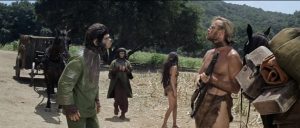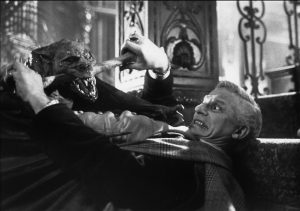By JUDY SLOANE
Front Row Features
HOLLYWOOD-Actor Roddy McDowall was born on September 17, 1928 in London, England. He made his film debut in the 1936 movie “Scruffy,” but it was his role as Huw in the 1941 classic “How Green was my Valley” that brought him fame at the early age of thirteen. Some of his other movies have included “Lassie Come Home,” “My Friend Flicka,” “The Greatest Story Ever Told,” “Cleopatra,” “The Poseidon Adventure,” “Planet of the Apes” and “Fright Night.
Roddy passed away on October 3, 1998. He and my mother were good friends; she had known him since he was a child actor. I got together with Roddy in the early 90’s and I asked him about his career and a few of the movies that he made. I told him I would throw out the name of a film and he could give me his recollections about it.
How Green was my Valley (1941)
Roddy McDowall: I have very happy memories working on “How Green was my Valley” because it was a very concise production; probably the most spare film I’ve ever worked on. (Director) John Ford was a man who, by that time in his life, virtually camera-cut. The film only took nine weeks to make. I can’t remember there being more than two takes on anything. Ford had a very checkered reputation; a lot of people said he could be very mean. He was terrific to me, which was lucky because I don’t think I would have been able to stand up to any sort of cruelty.
There’s one scene where there’s this whole hillside full of daffodils, all of which were fake. They were paper, and I remember having the best of times helping the prop men put all those daffodils out there. It’s a lovely scene.
Walter (Pidgeon) was a very special man. He was forty-four years old then and had been in films for a great many years as a reasonably successful actor. In that 18 month period he had suddenly in release “Man Hunt,” “How Green was my Valley,” “Blossoms in the Dust” and “Mrs. Miniver.” In that 18 month period he became a tremendous star.
Lassie Come Home (1943)
Roddy McDowall: “Lassie Come Home” was another film that was a stunning experience, the main reason being it was made at a very particular time, during the war, and it was a wonderful love letter about England. I really loved Lassie very, very much. I was absolutely insane about that dog. That dog was an extraordinary animal and until he died I would see him, and he would remember.
Elizabeth (Taylor) was a replacement in “Lassie Come Home.” Initially there was a girl called Maria Flynn who had been in “Intermezzo” with Ingrid Bergman and Leslie Howard, and by the time I came over to 20th Century Fox to do my scenes she had grown, and she was much taller, so overnight Elizabeth was cast in the film. I burst out laughing when I saw her because she was exquisitely beautiful. She had a double set of eyelashes.
I remember being furious at M.G.M. because they wouldn’t give me the dog (he laughs.) They gave Elizabeth the horse in “National Velvet,” and I couldn’t understand why they wouldn’t give me Lassie!
In the final scene of the film, it was so hot when I came out of the schoolhouse, the dog just wouldn’t lick my face, so on the upstage side they put ice-cream. So my face was covered in ice-cream! It was a really wonderful experience.
Cleopatra (1963)
Roddy McDowall: (He laughs) “Cleopatra” was a very long experience! I (was supposed to go) away for 12 weeks, and came back 52 weeks later. So much has been written about it, the legends of it are so complex and most of them are just rubbish. The film went into tremendous cost only because of bad planning. They wouldn’t allow Joe Mankiewicz to write the script before the film went into production. They exploited all personal aspect of peoples’ lifestyles to the point of insanity and the film ended up as a victim of sensationalism.
It was edited very heavily because Joe designed the project as two movies, not one, but nobody had the imagination in those days to do what happens a great deal today, which is to market two motion pictures. The tragedy is the film is much better than it was considered in its time. The full movie is almost six hours long, and the horrible part of it is all that footage was destroyed.
While Elizabeth and I were doing our confrontation scene (he starts to laugh) I always got the giggles because there we were two child actors, up there doing this scene and there were these terrible rumbles. Her stomach was rumbling, and neither one of us would give into the laughter, and so they had to cut and give her some bread!
I personally was thrilled to be a part of it. It established me as an adult actor in films again. It did not lose money. It made a great deal of money ultimately.
Planet of the Apes (1968)
Roddy McDowall: Nobody wanted “Planet of the Apes,” it was too expensive to do. The opposition toward the concept was the fact that nobody would want to watch actors of any note being covered up. The thing that made “Planet of the Apes” viable was the fact that Edward G. Robinson did a screen test, not for the role but to show that it could be done, and his whole personality came through. He could have never made the film because he had a heart problem and he couldn’t have gone through the movie with that claustrophobic make-up. The fact that Charlton Heston , who was a major star, agreed to do it gave it commercial viability and Franklin Schaffner did it for nothing, and became ultimately quite wealthy!
It’s not very often that somebody gives you the chance to play a monkey, which is a great challenge! And I loved playing those roles. Through the progress of all of the series I played three different parts, and I was always fascinated. Physically it was very difficult. The make-up was very difficult because in those days they were not as sophisticated as they are now. It took three hours to put all that stuff on, and from the moment you started putting it on it was literally coming off! But all of it was a happy memory for me.
I don’t think anybody ever projects that something will be that successful. One always thinks the film is going to work, but to be a runaway hit like that is just totally unpredictable.
Fright Night (1985)
Roddy McDowall: I was thrilled to get this part. To play a bad actor is a great challenge because all you do is really make the wrong choices. You act in a way that you would be arrested, but it had to be done with enormous conviction and with integrity and good taste. But it’s wonderful to make absolutely dreadful choices!
What he was is the Cowardly Lion. It’s a wonderful character. This was a very happy film. The sequel is good, unfortunately the sequel was buried. It had hardly any release at all. I think it only played in five situations. It was thrown away with very foolish handling of it.







